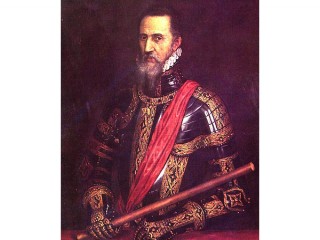
Fernando Alvarez De Toledo biography
Date of birth : 1507-10-29
Date of death : 1582-12-11
Birthplace :
Nationality : Spanish
Category : Historian personalities
Last modified : 2011-03-07
Credited as : General and governor, the Iron Duke,
Fernando Álvarez de Toledo, Duke of Alba, or Alva, was a Spanish general and statesman. Known as the Iron Duke because of his ruthlessness, he almost succeeded in putting down the rising in the Low Countries against Spain.
Fernando Álvarez de Toledo was born at Piedrahita on Oct. 29, 1507, into one of the oldest and most distinguished noble families of Spain. His father died when Fernando was young, and he was reared by a stern grandfather to be a strict Roman Catholic, a loyal servant of the king, and a disciplined soldier. By the age of 14 he was serving as an officer in the campaigns of Emperor Charles V against the French.
From 1531 Alba played a leading role in operations against the Turks, was promoted to general in 1533, and distinguished himself during the siege of Tunis in 1535. After defending Perpignan against a French assault in 1542, he was appointed by Charles V to serve Prince Philip as military adviser during the Emperor's absence from Spain. Alba joined Charles V in Germany in 1546 with the outbreak of the Schmalkaldic War and commanded the cavalry, which contributed heavily to the imperial victory at Muhlberg in 1547. In 1552 he took over general command of the Spanish forces in Italy, but when Maurice of Saxony rose unexpectedly and successfully against the Emperor and won the alliance of Henry II of France, Charles recalled Alba to Germany to lead the resistance to the French armies. However, Alba could not prevent the defeat of the imperial forces, which led to the Emperor's abdication in 1556.
Philip II, on becoming king of Spain, named Alba governor of Milan and commander in Italy. There Alba waged a war against the papal army of Paul IV, a French ally. Avoiding a direct attack upon Rome lest there be a repetition of the sack of 1527, Alba compelled the Pope to accept a peace in 1557, which consolidated Spanish domination of Italy for more than a century. Returning to the Low Countries, Alba participated in the negotiations which resulted in the Peace of Cateau-Cambresis (1559).
Rioting by Calvinist mobs in the Netherlands in 1566 led to Philip II's decision to send Alba to the Low Countries to crush them, root out Protestantism, and replace the ancient institutions of local and provincial government by ruling organs responsible only to Philip. Alba entered Brussels on Aug. 22, 1567, took over as governor general, and set up the Council of Troubles (called the Council of Blood by the people) to put down heresy and rebellion. The council operated with harsh rigor; even two of the most important noblemen in the country, the counts of Egmont and Hoorn, were arrested, tried, and beheaded; and over 1,000 men of all ranks were similarly punished (it was originally believed that the victims numbered about 6,000). Thousands fled abroad for safety.
Alba defeated the rebel armies of William the Silent and his brother, Louis of Nassau, in their forays into the Netherlands. He introduced a system of taxation into the Low Countries based primarily on the Spanish system of a sales tax of 10 percent on each transfer of goods; although the provinces bought their way out for the moment by lumpsum payments, there was profound anxiety that the prosperity of the Low Countries was being undermined. In 1572, the rebellion led by William the Silent shifted to the northern Netherlands. The next year Alba asked Philip II to allow him to return to Spain, and he sailed away from the Netherlands, still torn by rebellion, on Dec. 18, 1573.
On his return to Spain, Alba found himself in the King's disfavor. Nonetheless, in 1580 Philip entrusted the conquest of Portugal to him. Alba died in Lisbon on Dec. 11, 1582.
















